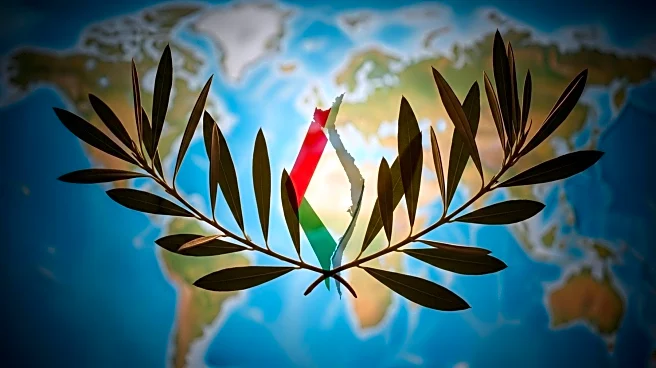What's Happening?
The United Nations General Assembly has voted overwhelmingly in favor of a resolution supporting a two-state solution to the Israel-Palestinian conflict. The resolution, which endorses the 'New York Declaration,' was passed with 142 votes in favor, 10 against, and 12 abstentions. The declaration outlines a phased plan to resolve the nearly 80-year conflict, despite Israeli Prime Minister Benjamin Netanyahu's firm opposition to the establishment of a Palestinian state. The resolution was co-sponsored by France and Saudi Arabia, following a high-level conference in July. The declaration condemns attacks by Hamas and calls for the Palestinian Authority to govern all Palestinian territories, with a transitional committee to be established post-ceasefire in Gaza.
Why It's Important?
The resolution signifies a strong international push for a peaceful resolution to the long-standing conflict, highlighting the global community's desire for stability in the region. The endorsement of a two-state solution could potentially influence diplomatic relations and negotiations, as it calls for the recognition of Palestine as a state. However, the opposition from Israel and its allies, including the United States, underscores the complexities and challenges in achieving a consensus. The resolution's passage may also impact the dynamics within the United Nations, as it reflects differing international perspectives on the conflict.
What's Next?
The resolution's approval sets the stage for further diplomatic efforts and discussions at the upcoming General Assembly meeting. The Palestinian leadership aims to gain recognition from additional countries, building on the support from over 145 nations. Meanwhile, Israel's continued settlement expansion and opposition to the resolution may lead to increased tensions and diplomatic challenges. The international community will likely focus on facilitating dialogue and negotiations to address the humanitarian and political issues in the region.
Beyond the Headlines
The resolution's passage highlights the ongoing struggle for Palestinian statehood and the broader implications for regional peace and security. The call for an international stabilization mission under U.N. auspices reflects the need for external support in maintaining peace and security. The resolution also emphasizes the importance of addressing humanitarian concerns, particularly in Gaza, where the conflict has resulted in significant civilian casualties and infrastructure damage.










